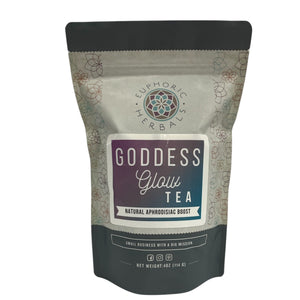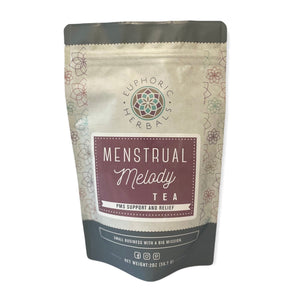What is Ashwagandha Root?
If you want to step into the world of adaptogens, ashwagandha is a great starting place. It has been used for thousands of years to help with stress, energy, and better sleep- something most people could benefit from.
Ashwagandha is also one of the most valued herbs in Ayurvedic medicine. It's considered balancing for the vata and kapha doshas and has a simultaneous calming and energizing effect.
Here's more about the top health benefits of ashwagandha and how it can help bring you back into balance.
Ashwagandha (Withania somnifera) is an adaptogenic herb native to India and other areas of southeast Asia. The name "ashwagandha" roughly translates to "smell/strength of a horse." This is thought to refer to its ability to impart the strength of a horse to those who take it- and how the fresh herb smells.
You can get an idea of how powerful ashwagandha is by looking at how the plants grow.
Ashwagandha plants belong to the nightshade family (along with tomatoes, potatoes, peppers, etc.) and grow as small evergreen shrubs. They thrive in soil that most other plants struggle or die in and impart this stress-resistant nature to the human body.
All parts of the plant are believed to have medicinal value, but the roots are the most used, either as a powder, extract, or cut and sifted.
You may also hear ashwagandha referred to by a few other names, particularly winter cherry or Indian ginseng. However, it is a completely different plant than true ginseng, although it does have similar energy-giving properties.
What are the Health Benefits of Ashwagandha?
Eases Stress and Anxiety

As an adaptogenic herb, one of the main properties of ashwagandha is its ability to help your body resist and recover from the effects of stress. Like other adaptogens, it has what is called a "normalizing" effect that helps you cope with both physical and psychological stressors.
Some studies indicate that this could be because ashwagandha helps regulate certain stress factors within your body, including cortisol (the stress hormone). (1)
The normalizing, calming effect of ashwagandha can also benefit those who deal with anxiety. A few small studies have shown that taking the extract may help relieve symptoms of anxiety with none of the serious side effects that can come with conventional medication. (2)
However, it's important to realize that ashwagandha doesn't work instantly. Give it at least 1-2 months to build up in your system and take full effect.
Sleep Aid
By having a calming effect on body and mind, ashwagandha can help with sleep, particularly if taken in the evening.
In fact, the Latin word somnifera, which is the second part of ashwagandha's botanical name, means "sleep-promoting" or "sleep-inducing."
In Ayurvedic medicine, a hot beverage made of ghee, honey, milk, and powdered ashwagandha is a common sleep tonic that can be taken an hour or two before bedtime.
Some research shows that simply taking the root extract may also improve sleep quality. (3)
Improves Energy & Helps Adrenal Fatigue
Another one of the top health benefits of ashwagandha is its ability to boost both physical and mental energy. It can especially help with stamina and aid the body in recovery from an energy-depleting illness.
You might be wondering how this herb can help with both sleep and energy, but remember that it has a normalizing effect on your body. This means it provides the support that is needed most instead of just having one specific action.
Research shows that not only can ashwagandha boost how energetic you feel, it can also improve physical performance during exercise and possibly increase muscle strength. (4)(5)
Ashwagandha can also be used as a natural aid for adrenal fatigue. Again, this is mainly due to its balancing and nourishing effect on your whole body and particularly on your endocrine system.
Boosts Your Mood & Brain Power

By reducing stress and anxiety, ashwagandha can automatically put you in a better mood, but it has also shown some specific benefits for improving mental health.
For example, it has shown an ability to help with symptoms of depression and has shown potential for aiding bipolar disorder and schizophrenia. (6)(7)
Other research indicates that ashwagandha helps protect your brain from degeneration as well as from stress. It contains antioxidants that appear to improve cognitive function, including memory, and may help keep your mind sharp for longer. (8)(9)
(Try it in this Good Mood extract.)
May Boost Fertility & Testosterone Levels
One of the most traditional health benefits of ashwagandha is to improve sexual function and fertility in both men and women. It has also long been considered an aphrodisiac, which means it can help boost libido as well.
More recent research has shown that ashwagandha may be particularly helpful for male sexual health. It appears to work as a natural testosterone booster and has increased sperm count in a few studies. (10)
Again, these studies were conducted over a period of 2-3 months, so you need to give ashwagandha time to work for the most benefit.
Supports Thyroid Function
Ashwagandha can help with overall hormone balance, but it has shown special potential for helping out your thyroid.
Specifically, research has shown that the root extract can improve levels of thyroid stimulating hormone (TSH) and thyroxine (T4), which could be particularly beneficial for those with hypothyroidism. It also had a normalizing effect on thyroid levels overall. (11)
It's not clear whether ashwagandha would have a negative effect on those with a hyperactive thyroid or whether it merely helps keep the thyroid in balance.
Overall Health Tonic
In the western part of the world, people mainly think about taking a drug or an herb for a very specific problem (and usually only after something goes wrong).
However, eastern and other traditional medicinal practices have a history of using what could be called health tonics to support overall vitality and longevity. Ashwagandha is one example of this and is considered a rasayana, which means a rejuvenative herb.
It's especially beneficial for those who need extra nourishment and supports vitality, longevity, and happiness.
How to Use Ashwagandha

Ashwagandha can be used in many ways but is found most commonly as a powder or an extract. You can also use the dried root to make tea or simmer it with milk (from cows or plants) to make a nighttime beverage.
For a specific issue, you may want to try ashwagandha in combination with other supportive herbs, like in these products:
- ThyroFem (thyroid support)
- Good Mood extract
- Adrenal Assist capsules
- Golden Milk (with turmeric)
Because the root and powder have a strong taste, many people like to add honey to make the remedy taste better.
What are the side effects of Ashwagandha?
Ashwagandha is a very safe herb and most people experience no unpleasant effects when taking it. However, it is a member of the nightshade family, so you should avoid it if you have an allergy to this plant family.
There is a possibility that ashwagandha may interact with certain medications or affect thyroid health, although no studies have confirmed this for certain.
Large doses of ashwagandha are not recommended during pregnancy.
Less Stress, More Energy
If you could use less stress, better sleep, and more energy, you might want to look into the health benefits of ashwagandha. This herb has been used safely and effectively for thousands years and is especially powerful at bringing the body back into balance.
Don't forget to take it long-term for the best results, allowing this wonderful herb time to do its work.
Disclaimer: This post is for informational purposes only. It does not constitute medical advice and should not be substituted for medical advice. Please consult your health care provider, herbalist, midwife, or naturopathic physician before taking herbs, supplements, etc. Here's the link to our full disclaimer.














































































































































































